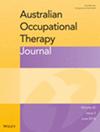Evaluative judgement in practice education: How does the ability to judge the quality of work impact placement performance?
Abstract
Introduction
Occupational therapy students need to be ready to work autonomously in a range of environments as soon as they complete their degree. Practice education experiences are considered key to students developing the competencies that autonomous work requires. To function autonomously in practice environments, it is argued that practitioners need to be able to judge the quality of their own work and the work of others. This is referred to as evaluative judgement. However, there is limited empirical literature relating to evaluative judgement and even less exploring the concept within occupational therapy.
Methods
This study used qualitative methods, seeking to understand the evaluative judgements of clinical practice made by third- and fourth-year occupational therapy students during practice education.
Results
Twenty-one interviews were conducted with third- (n = 10) and fourth-year occupational therapy students (n = 1), university support staff supporting practice education (n = 4), and practice education supervisors (n = 5) at one Australian university. Practice education grades and documentation were also used as data. Data were analysed thematically, and two themes, each with three sub-themes, were identified: students coming to understand expected standards, with the following sub-themes: students attuning to cues, cues that inform supervisors about students' meeting the standards, and barriers and frustrations to understanding standards; and practising and developing evaluative judgement, with the following sub-themes: making comparisons, acting on feedback, and reflective practice.
Conclusions
Practice education experiences provide many context-specific opportunities for students to develop their evaluative judgement. Students may be supported to come to know what quality work looks like by offering scaffolded opportunities to develop evaluative judgement in university and practice education settings.

 求助内容:
求助内容: 应助结果提醒方式:
应助结果提醒方式:


